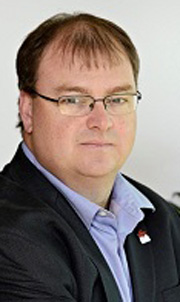Besides supplying clean, renewable energy, Canada’s rapidly growing wind generation sector can provide plenty of economic benefits for depressed areas, according to a national wind energy research leader who will speak here Wednesday.

Wind Energy Institute of Canada CEO Scott Harper. |
“There are dozens of guys here making a living just off of servicing turbines,” Scott Harper, CEO of the Wind Energy Institute of Canada said during a phone interview from his office in Prince Edward Island on Friday. “That’s not including all of the other spin-off jobs in the service industries, like welding shops and tooling.”
Located in the North Cape area of PEI, the institute’s 38-acre site can accommodate a variety of wind turbines for testing and research. The institute also owns a recently constructed wind farm capable of generating 10 megawatts of electricity, Harper said, and because it’s at the end of a radial transmission and distribution system, it offers a unique opportunity to study such issues as system stability. There are also plans to install a grid-tied energy storage system which is expected to be commissioned in November.
Harper said PEI has one of the most progressive policies in the country regarding wind energy. With WEICan’s 10 megawatt project now online there are about 174 megawatts, or a little over 20 per cent of the island’s total energy mix, that are generated by wind. That figure will soon increase to almost 30 per cent with other new projects coming on line, he added.
About three per cent of all electricity in Canada is generated by wind, with more than 6,500 megawatts already installed across the country Harper said. The penetration rate varies from region to region depending on the strength of the resource, the distribution systems, and other factors, however great potential for new development in many areas still exists, he said. The Canadian Wind Energy Association is predicting 1,500 megawatts will be installed annually for each of the next four years.
“It all comes down to the energy mix and the economics of bringing more wind into a region,” said Harper, whose visit to the area this week will be his first. “It’s not a one-size-fits-all kind of situation. There are challenges, but there lots of solutions too.”
Besides meeting with engineering professor and wind energy expert Rupp Carriveau to discuss potential research collaborations, Harper said he also hopes to meet graduate students and engineers who may be interested in working at the institute. He’s currently looking for a new engineer, as well as a grad student interested in an eight month internship available at the institute.
“We haven’t had a student from your school on this internship yet, and we’d certainly welcome that,” he said.
Along with Richard Hassard, president of the institute’s board, Harper will make a brief presentation about the institute’s objectives and then be available to meet with faculty and students. The meeting will be held April 24 at 11 a.m. in Room 3000 at the Ed Lumley Centre for Engineering Innovation.
